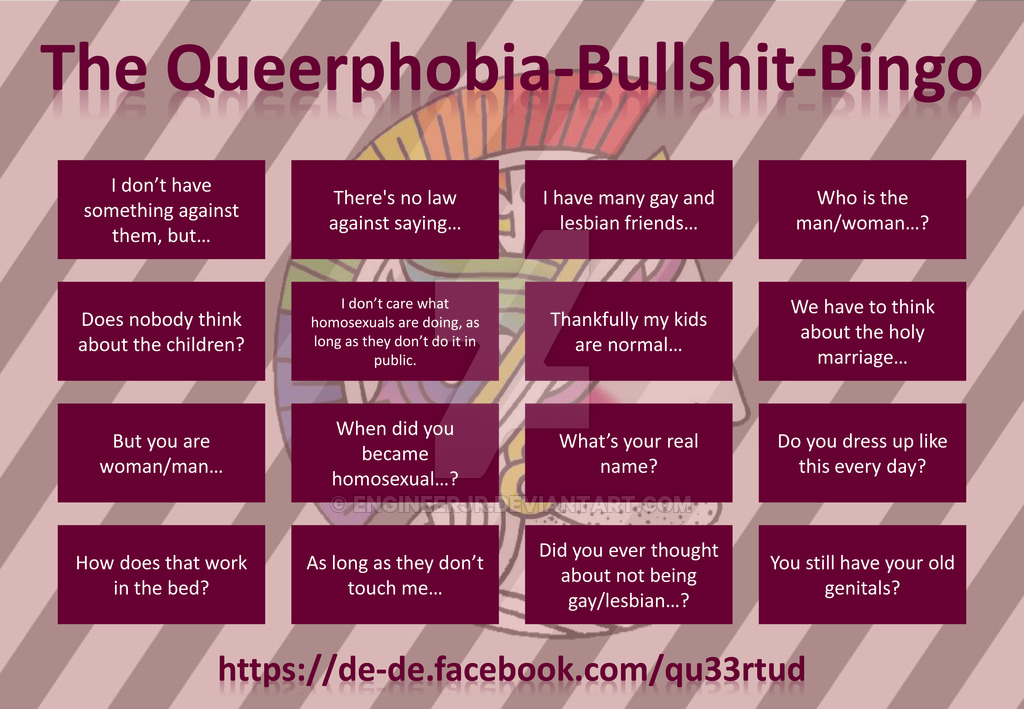“I’m not Queerphobic, but . . .”
But what? You’re going to push through it and say something queerphobic, defend something queerphobic, or present faulty reasoning for your own queerphobia–right? Probably. Out of all the follow-ups to the dreaded “but. .,” the one heard most often specifically from Gen Xers is: “it’s a generational thing.”
It’s a what?
Well, it was a different time. Nobody spoke of the existence of Gay and Lesbian folks, let alone Trans* folks and the rest of that silly ‘alphabet soup.’ Next to nobody was ‘out’–and now everyone is coming out; just another millennial bandwagon. So how can these queerphobes possibly be at fault, since it was ‘less common,’ and was still a Bad Thing to most people when they were growing up–how were they even supposed to know that it isn’t ever okay to be queerphobic as shit? And now they’re expected to just give up their beliefs? Everything they were taught was true? It’s just not fair to hold such an expectation. Kids these days, acting so entitled with all this pressure to be ‘politically correct,’ are downright unreasonable!
The fallacies of this excuse (because that’s what it is: an excuse) lie in the inherent presumptuous laziness it unabashedly displays, and in the Unquestioningly Respect Your Elders’ Beliefs as Fact Because That’s How They Did It Back When They Were Young ego complex. Perceived truth does not amount to real truth, regardless of how much conviction is poured into that perception, regardless of how many people told a person that a given perception is true. Assuming that because something was not (openly) spoken about that thing did or does not exist is a Strawman defense. (A ‘Strawman defense’ or ‘Strawman argument’ is an argument or retaliation that doesn’t address the subject at hand, attacks a person or group instead of the subject, brings in unrelated subject matter to falsely attach to the subject at hand, and other flimsiness deployed; “I have a friend that’s gay, so I can’t be a homophobe” is an example of a Strawman argument.)
By that logic, gravity didn’t exist before the 17th century because it had not been discovered yet and thusly wasn’t spoken about. Nor did gravity exist even after it was proven true since nobody (openly) discussed it for fear of prosecution and ridicule. A powerful group (in this case the Church) decried gravity at the time, and because laypeople were told gravity was A Bad Thing, the belief that gravity was a lie–A Bad Thing–it was perceived as truth. By the same logic, that belief amounted to truth. Throughout the centuries, the theory of gravity has been accepted, albeit tentatively at first for the above mentioned reasons. Slowly, more people (openly) spoke about it, more people became informed, and, because information was disseminated, more people rejected the perception that gravity was not real.
If this sounds silly to you–that gravity didn’t exist before it was (openly) spoken about–that’s because it is. Now try replacing ‘Gravity’ with ‘LGBTQIA+.’
It’s not a generational thing. Sure, it’s not easy to denounce long-held beliefs, but it is possible, especially in this technological age where information is readily available. If one holds a true desire to educate themselves (and is willing to take the time to differentiate anti-queer propaganda floating about in the technological ether from fact and listen to LGBTQIA+ people about LGBTQIA+ experiences). Or, perhaps this is being generous; instead, we could talk about all the folks who do not buy into this oppressive falsity yet grew up in the same generation being utilized as a thinly veiled excuse. In a similar vein, we could talk about all the LGBTQIA+ folks who grew up in the same generation, closeted or otherwise, that the ‘Generational Thing’ group describes as non-existent or existing in significantly lesser numbers; or we could talk about all the folks who did believe Queerphobia was the way to go but relinquished such views as visibility grew and information became disseminated, once people started talking about it.
Still, it is true that some people have never been told “hey, don’t be mean to Queer folks, it’s never okay, and here’s why.” I’ve met many, many people who were honestly unaware they were being Queerphobic, lots of them Gen Xers, and this isn’t being said to discredit those people who are working on the difficult act of unpacking prior beliefs and reflecting on why they held these beliefs in the first place. This alone proves that Queerphobia is not simply a product of the generation one grew up in, and continuation of active Queerphobia doesn’t stem from one generation or another, and doesn’t necessarily hinge directly on beliefs internalized while growing up. Continuation is an active choice; perpetuation is an active choice.
The difference here, between Gen Xers who were previously Queerphobic and Gen Xers who excuse their Queerphobia as an inevitable product of growing up in a given generation, is willingness to learn. Such excuses truly don’t give much credit to the human Mind; to the human ability to sympathize; to each person’s unique, complex ways of understanding unique, complex social problems; the ability to choose; to self-analyze; to understand–or at least try to understand–the subjectivities of ‘Good,’ ‘Bad,’ and grey areas; and to make changes in themselves, for themselves. To admitting, to unpacking, to learning, to realizing, to letting go, to working on oneself in order to strive towards a greater good.





